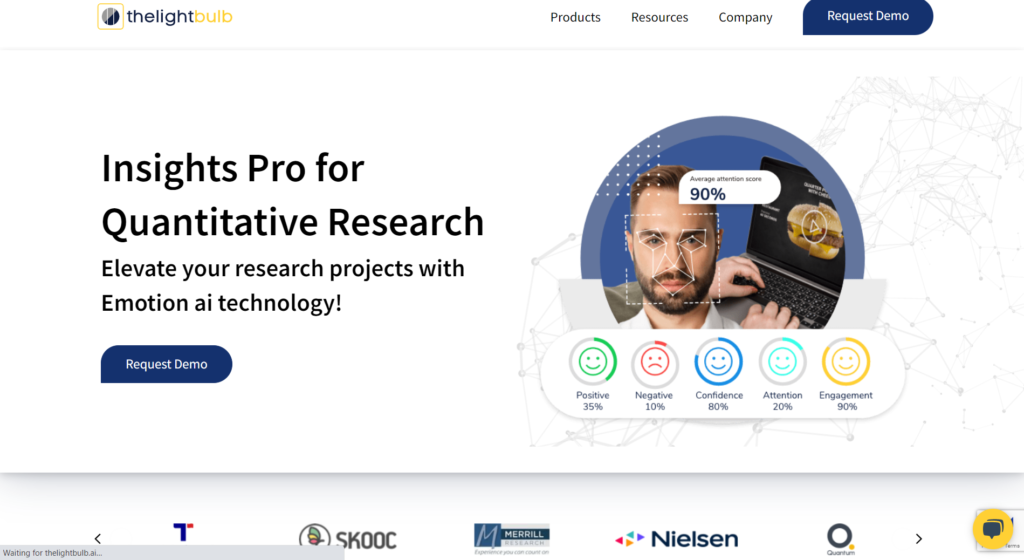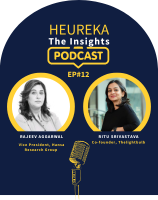
Market research techniques have been known to be invaluable for businesses across the globe in their endeavours to source new consumer insights and/or market information. This responsibility of keeping the consumers satisfied and content now rests with the business organizations. While this may seem like a reasonable assumption, it does account for their heavy application of specific market research methodologies to seek out market opportunities and achieve several degrees of further consumer service.
That is why market research can also be considered as an indispensable tool in the sphere of corporate activity. Our hope is that with this blog, we will be able to introduce a few new techniques that are likely to be used in the coming year’s market research, as well as discuss why the new technologies like emotion AI should be used in the research field.
Why are Market Research Techniques Important for Businesses?
Market research is the primary tool that provides a light to businesses to navigate through the changing and rather fluid today’s market. It should not be underemphasized as it forms the bedrock of decision-making in undertakings to make better decisions based on data. Another benefit of market research is it enables the business to know their customers, the competition it faces and the market environments it operates, thus enabling it to position itself appropriately.

Fundamentally, market research helps organizations stay focused on the customer by providing essential insights on market opportunities and trends. It is about establishing focus on the consumers and understanding their needs and wants.What does a consumer want and need – understanding these notions is the core of the concept of marketing. It has been gathered that genuinely customer-centric businesses are 60% more profitable therefore, it is right to say that prioritising the customer is the correct thing to do. Segmentation targeting positioning stp through the use of advanced models like the STP, it is easy for the companies to market their products among segments of the market that will respond well to the products through the use of the marketing strategies that have been adopted.
With the help of the audience’s characteristics in terms of demographic data, interests, and activities, it’s possible to pick the right media platforms and create the material that suits the chosen segments. Thus, market research enables one to minimize risks involved in new product development by proving its concepts and checking the requirements for a particular product or service. It saves financial might from being channeled to unproven market propositions that would not have any growth potential in the market.
Market research techniques are vital in that they enable a firm to achieve a competitive edge in the market. Focusing on the needs and wants that have haven’t been met yet by other businesses, firms are able to thrive past competitors and aim at specific untapped niches. This makes them more competitive, flexible and attuned to the fast-evolving consumer world as well as better placed to increase their market share.
Other advantages of market research are also quite evident: Market research techniques also enable companies to keep abreast with the trend line. It provides actionable knowledge on trends in the consumption patterns and strategic shifts within the market. Specifically, market demands cannot be overemphasized when it comes to industries that experience changing cycles frequently, in this case, fashion, and technology industries. It helps entrench the notion that organizations are relevant in the ever changing market and give consumers value by providing the right products and services in the market.
Avenues for Market Research
There are two primary avenues you can source research data from-

1. Primary Research Avenues
Primary avenues are a more direct way of sourcing fresh consumer insights through direct interaction with the consumers. Some examples of this would be one-on-one interviews, focus groups, and surveys. Companies usually pay a research institute or organisation to use these market research techniques and unearth fresh insights from the market.
2. Secondary Research Avenues
Secondary research avenues offer research that has already been completed by other organisations. For instance, Grand View Research is one of the best research organisations that offers research data to companies from the S&P 500.
9 Powerful Market Research Techniques for 2024
Listed below are the 9 best techniques for market research that companies can truly rely on to grab the changing market wave and ride it in 2023.
-
Qualitative Interviews
Qualitative or Direct interviews are one-on-one interactions between a moderator and a participant. It focuses on exploring and understanding people’s experiences, perceptions, attitudes, and in-depth behaviours. This research method aims to uncover the underlying motivations, feelings, and cultural contexts that drive human actions. Qualitative research is often used to answer “why” and “how” questions rather than “what” or “how much.”
2. Focus Groups
Focus groups are one of the most popular market research techniques. It is a research method that involves a small, carefully selected group of participants discussing specific topics, typically related to a product, service, or idea. The purpose is to collect qualitative data and gain insights into the opinions, attitudes, and reactions of the participants. A trained moderator guides these discussions, ensuring they remain focused and productive. Focus groups are used to better understand the perspectives of a target audience and can be valuable for market research, product development, and gauging public opinion.
3. Ethnographic Research
Ethnographic research is a qualitative research method focused on the systematic study of people within their natural environments to gain a comprehensive understanding of their way of life, cultural practices, and their interactions with their surroundings. This research approach offers a detailed, in-depth account of a social setting from the perspective of the participants involved.
Researchers conducting ethnographic studies typically immerse themselves in the community or group they are studying for an extended period. This immersive approach allows them to gain valuable insights into social interactions, behaviours, and practices. Data collection methods in ethnography include participant observation, face-to-face interviews, and in-depth conversations.
4. Observations
Observations or Observational research is one of the simplest market research techniques. It is a qualitative approach focused on studying individuals and phenomena in their natural environments. Unlike controlled settings, such as laboratories or focus groups, this method involves observing and documenting subjects’ behaviours and reactions as they naturally occur.
The key principle is to minimise interference, ensuring authenticity in data collection. Observational research includes multiple techniques, including naturalistic observation (unobtrusive observation), participant observation (researchers actively participate while observing), and structured observation (observing in controlled environments to study specific behaviours). Researchers choose the most appropriate method based on their research goals and the level of control required.
5. Surveys
Surveys are structured methods of collecting information or data from a group of individuals by asking them a series of questions. These questions can be delivered through various mediums, including paper and pencil, online forms, telephone interviews, or face-to-face conversations. Surveys are usually conducted to gather data that represents the surveyed group, allowing researchers or organisations to make informed decisions, draw conclusions, or understand trends.
Key characteristics of effective surveys include clear and concise question design, impartiality, and avoiding leading or biased questions that might influence respondents’ answers. They are a valuable tool for businesses and researchers to gain insights into customer preferences, employee satisfaction, market trends, and a wide range of topics.
6. Field Trials
Field trials are one of the market research techniques often used in healthcare circles to test the efficacy of medicines. These trials are designed to evaluate prevention strategies, health education methods, training procedures, or other public health programs. They are distinct from clinical trials in that they involve individuals who are not patients suffering from the disease in question.
The key distinction lies in the fact that field trials focus on individuals who have not yet contracted the disease being studied. These trials aim to assess the effectiveness of preventive measures rather than treatment protocols. Field trials play a significant role in public health and epidemiology by providing insights into the impact of interventions on populations considered at risk for specific health issues.
7. Competitor Analysis
Competitor analysis is a systematic process of evaluating and scrutinising the strategies, strengths, weaknesses, and performance of rival companies or brands operating in the same industry. It offers you insights on questions like how your business fits into the larger competitive landscape.
At its core, competitor analysis involves in-depth research into the products, services, branding, and marketing approaches of your competitors. It goes beyond merely recognizing who your competitors are; it delves into the specifics of their business activities, which can provide invaluable lessons for your growth and success.
8. Purchased Data
There are instances where companies don’t have exorbitant funds to conduct primary research themselves, that’s when the secondary avenue proves to be useful. Companies can buy research data from organisations for a one-time fee or subscribe to a monthly service, where they get access to fresh research across sectors every month.
9. Public Data
Public data in market research refers to information and data that is publicly available and accessible to anyone. This data is typically not proprietary or confidential and can be obtained from research centres, government databases, polls, academic publications, and publicly accessible online resources. It is one of the most valuable market research techniques across corporate circles, as it does not require any capital.
How can Emotion AI Help in Market Research?
Traditional market research techniques such as the ones mentioned below sure are great, but there is one problem with the insights drawn from such techniques. There is no way to verify the authenticity of the responses from these market research techniques.
Consider this for instance, when a company or an organisation conducts a survey and incentivises participation. The participants have a natural inclination towards the incentives rather than offering genuine insights in that survey, and most participants rush through the survey without paying heed to the questions, just for the sake of the incentives. Now, the quality of the insights drawn from such surveys is often questionable.
The same goes for every other market research technique out there. This is exactly what emotion AI solves. Emotion AI is a subset of AI that can record, interpret, and analyse human emotions using advanced tools like FACS, voice transcription, visual tracking, and conversational intelligence. We have a detailed blog on how emotion AI can revolutionise market research that you can read here.When organisations use emotion AI with traditional market research techniques, the quality of the insights drawn from these techniques is richer and more authentic, because one now has the option to remove unauthentic and insincere responses from the insight pool and work with genuine responses.
For instance, organisations can use Insights Pro to analyse live interviews, focus groups, or surveys and the software will break down the entire interaction into individual frames and extract emotional insights from every frame using facial coding analysis. One can easily access, download, and share these insights from the dashboard. You can book a free demo here to explore all the features of the product.

Conclusion:
Market research offers inherent benefits and organisations have been relying on them to fill market gaps for decades now. However, the veracity of the insights drawn from conventional market research techniques like surveys, focus groups, and interviews is questionable since humans can choose to be dishonest.
Emotion AI helps solve this and facilitates richer insights and in turn directs more powerful actions helping organisations achieve the same results more quickly. The future of market research is taking a new form and emotion AI offers the scaffolding for this exciting metamorphosis.









